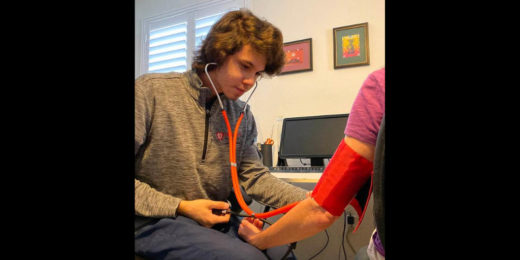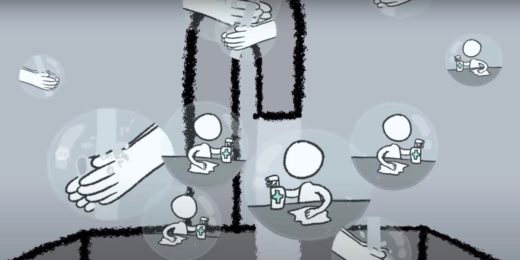Physician assistant student Patrick Lowery discusses his former life as a professional pitcher and what made him decide to pursue a medical career.
Author: Mandy Erickson
Stanford physician-programmer creates Coders Against COVID
A Stanford anesthesiologist co-founded a volunteer organization that maps COVID-19 testing locations and displays updated data about the pandemic.
Souped-up smartphones can gauge intoxication by measuring walk
A smartphone add-on, devised by an emergency medicine physician now at Stanford, detected a drunken stagger, through side-to-side sway, with 90% accuracy.
Virtual anatomy labs and at-home dissections: Stanford summer programs thrived online
Stanford Medicine educators found creative ways to teach summer courses to high school and undergraduate students during the pandemic.
Stanford medical student’s tweet about blueberry pickers’ wages goes viral
Incoming medical student and blueberry picker Gianna Nino caught the attention of the media when she tweeted about farmworker wages.
A Stanford Medicine professor aches over anti-Black racism
Shaken by the death of George Floyd, Stanford gastroenterologist Uri Ladabaum penned a hearfelt essay on racism and medicine's responsibility to fight it.
Many early COVID-19 studies have low-quality design, risk low-value evidence, research finds
Many early clinical studies of COVID-19 fail to meet quality standards, raising concerns that the data could be of little meaningful use, research finds.
States allow misleading claims that cannabis can treat opioid addiction
Stanford-led research examines state rules allowing dispensaries to make erroneous claims about the effectiveness of cannabis in treating opioid addiction.
Black medical workers write, reflect on racism
On the radio show "Forum," Black medical workers spoke about the new awareness of racism, and how writing helps them process their emotions.
How to stay safe as COVID-19 orders are relaxed
Stanford Health Care chief of staff Megan Mahoney, MD, answers questions about how to avoid the spread of COVID-19 as restrictions are loosened.
Unexplained kidney disease in California more likely near agriculture
Stanford researchers found that Californians living in areas of high agricultural activity are more likely to have unexplained end-stage renal disease.
Setting your biological clock, reducing stress while sheltering in place
Going outside soon after waking — rather than hopping directly onto a video call — will help you sleep better, says a Stanford vision researcher.
Students help physicians with rapid-response COVID-19 answers
Stanford medical and physician assistant students are helping primary care practitioners stay up-to-date on the evolving COVID-19 pandemic.
Heart transplant patient’s family shares love — from a distance
The COVID-19 pandemic kept a young patient's family from being by her side following her heart transplant. But they found a way to show their love.
Creating a human connection during a video health care visit
As health care appointments move online during the COVID-19 pandemic, Stanford researchers offer tips for retaining a human connection with patients.
Animated COVID-19 prevention video goes viral
Two videos created by a Stanford Medicine educator are being used to teach people around the globe about how to prevent the spread of the coronavirus.

















